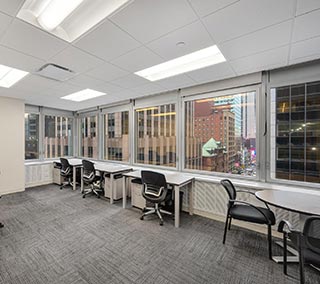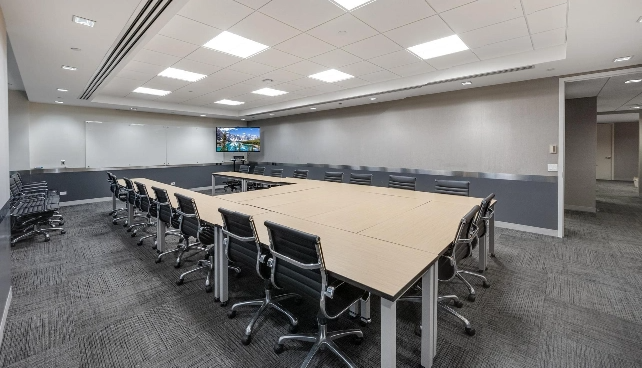The difference between a serviced office and a coworking space is that a serviced office offers a private workspace that includes full furnishings whereas a coworking space may be occupied by multiple companies and individuals. A serviced office is similar to a traditional office space since many are located in office buildings, but serviced offices may be rented out as individual offices, suites or floors instead of a business occupying an entire building. Coworking spaces are usually open spaces that allow freelancers, startups, digital nomads, non-traditional organizations and others to share workspaces and the cost of these spaces with others.
What is a Serviced Office?
A serviced office is an office space that is managed by a property management company or building manager. These offices are furnished, and general maintenance and janitorial services are often provided by the management company. Only one tenant occupies each office space or floor within a serviced office building, and lease terms are usually more flexible for businesses seeking serviced offices compared to a traditional office building lease.
What is a Coworking Space?
A coworking space is a shared work area in which multiple businesses occupy the space, but businesses usually need to reserve space since only one business can take up one workspace at a time. Coworking spaces may be housed inside traditional office buildings, but they can also be made available in non-traditional office spaces like warehouses. Some coworking spaces are large, open spaces that are cordoned off to designate different areas for different tenants or businesses. Others offer rooms with each being designated to one tenant or business at a time.
How Are Serviced Offices and Coworking Spaces Different From One Another?
There are a number of differences between a serviced office and a coworking space, and understanding these differences can help business owners choose which one works best. Below are some of the main differences between a serviced office and a coworking space:
Different Factors Affect the Cost
The cost of a serviced office tends to be higher than that of a coworking space. Part of the reason for the higher cost is that these spaces provide amenities and offer private workspaces, including suites and entire floors.
In a coworking space, each tenant may be responsible for sharing costs for maintenance and janitorial services and may also be responsible for keeping areas clean. Additionally, the cost of leasing is split among tenants. These factors can result in lower overall costs for both business owners and management of the coworking space.
Office Space Flexibility & Availability May Differ
A serviced office may have less availability and flexibility compared to a coworking space. Serviced office spaces only lease to one business at a time, so if a business is already occupying office space, that space will not become available until the current tenant moves out. Lease terms usually run by the month, day or hour.
In a coworking space, available space is split and shared between different businesses at different times. This allows for more availability, even when some space is already occupied.
Both Offer Different Business Support Services
Business support services like receptionist services and intraoffice communications and networking technology can often be found in serviced office solutions. Most serviced offices provide access to the Internet, and this connection may be shared across the building or on dedicated channels. Others will also provide receptionist services and mail and package acceptance.
Coworking spaces typically offer limited access to business support services, but this will depend on the location. A coworking space may have someone answering the main telephone line to the building, but that person generally will not be tasked with taking and relaying messages for renters. Instead, they generally serve as customer service for the coworking space. Some coworking spaces also provide access to virtual mailbox services and allow tenants to use the physical address of the coworking space as a business address.
Serviced Offices Offer Privacy & Security
A serviced office offers more security and privacy compared to a coworking space. Because serviced office spaces are reserved for only one business at a time, you won’t have to worry about someone else having access to your company’s workspace while you’re not in the office. This can also reduce the potential for theft in the workplace.
Coworking Spaces Provide Greater Networking Opportunities
While both serviced offices and coworking spaces offer networking opportunities, coworking spaces tend to provide greater access to other professionals since spaces are shared. A coworking space may be occupied by businesses in different industries as well, so they can provide networking opportunities with businesses your company may not normally interface with.
Both Have Varying Amenities & Facilities
Serviced offices and coworking spaces may provide amenities like fitness centers or cafeterias, but amenities vary by location. In general, serviced offices usually provide more on-site amenities compared to coworking spaces.
Access Control & Visibility Are Different Depending on the Workspace
Access control for both serviced offices and coworking spaces tends to be strong; however, in a serviced office, only one business uses office space at a time. In a coworking space, multiple businesses share the space at a time or on a scheduled basis. This can make a coworking space slightly less safe if you plan to leave sensitive information lying around a workspace.
In terms of visibility, a serviced office will usually be more visible since these types of office solutions are located in business districts. Coworking spaces may have visibility as well, but these types of workspaces can be found in non-traditional areas outside of business parks.
Both Solutions Present a Professional Image in Different Ways
Presenting a professional image is crucial if you want customers to take your startup seriously. Serviced offices and coworking spaces allow businesses to use the address of the office building as the business address, and this helps businesses without a traditional office lease to present a professional image.
Benefits and Disadvantages of Serviced Offices and Coworking Spaces
Coworking spaces have pros and cons. How much these affect your decision to use a coworking space depends on your business needs. Below are the benefits and disadvantages of serviced offices and coworking spaces:
Benefits of a Serviced Office Solution
A serviced office is often a good solution for larger companies that have the workforce and capital to justify occupying an entire office or floor of an office building. Below are some of the pros of a serviced office solution:
Greater Flexibility for Large Companies
Serviced offices offer flexibility for large companies since many serviced offices have room to grow. If a business needs to add more space, most serviced office buildings can open access to new floors or simply add access to more desks.
Improved Cost-Efficiency for Centralized Businesses
If you operate a centralized business in which all of your employees and resources need to be located in one office space, a serviced office may offer greater cost-efficiency.
Serviced Offices Present a Professional Image
A serviced office is usually located in a business district in a metropolitan area. Occupying one of these offices presents a professional image and helps build trust with customers.
Access to Amenities is Usually Greater in a Serviced Office
Serviced offices often provide access to a number of amenities. These are usually located in common areas and are shared by all businesses located in the serviced office building.
Networking Opportunities With Nearby Businesses
Because most serviced offices are located in business districts, this can improve networking opportunities for large companies that occupy these spaces.
Disadvantages of a Serviced Office Solution
Although serviced offices offer a number of benefits, there are also some cons to be aware of. Below are some disadvantages of choosing a serviced office:
You May Face a Higher Cost Per Square Foot in a Serviced Office
Serviced offices often have a higher cost per square foot compared to coworking spaces. This is usually because of the added amenities and services provided by the building manager of a serviced office.
There is a Lack of Customization Options in a Serviced Office
Business owners may not be able to customize a serviced office space in the same way as a coworking space, but this depends on the terms of the lease. Some serviced offices allow for a limited amount of customization, while others give more freedom and flexibility.
Business Owners Usually Have Limited Control
In keeping with the point above, business owners in a serviced office often have limited control over the choices made by the building manager. Some serviced office managers may ask for input from tenants, but by and large, business owners occupying these offices have little say in the big decisions made by building managers.
Benefits of a Coworking Space for Small Businesses
A coworking space may be a better option if you work as a freelancer or are part of a small startup that doesn’t require a large office space just yet. Below are some of the benefits of a coworking space:
A Coworking Space Can Provide Cost Savings
Coworking spaces are often less expensive compared to alternatives since costs are shared among the space’s tenants or renters.
Coworking Spaces Offer a Lot of Flexibility
A coworking space can usually be rented by the day or hour and does not require a membership or long-term commitment, allowing for greater flexibility compared to a traditional office space.
There are Many Networking Opportunities With a Coworking Space
Because coworking spaces are shared, they can be great places to network with other local professionals.
Limited Amenities and Services May Be Available in a Coworking Space
Some coworking spaces offer limited amenities like Internet access and on-site snacks and drinks.
Disadvantages of a Coworking Space
Coworking spaces are a great option for freelancers, “solopreneurs” and startups, but they also have some disadvantages, including:
Workspaces Often Come With Noise and Distractions
Since coworking spaces are shared with others and may not offer much space to spread out, noise and other distractions can be a problem.
Limited Privacy Can Be an Issue in Coworking Spaces
The lack of space and individual offices in a coworking space means that business owners often have limited privacy compared to serviced offices or traditional office spaces.
Shared Amenities and Resources May Mean Less Personalization
Some coworking spaces allow limited personalization, but because renters come and go and spaces are shared, most coworking spaces cannot be heavily customized by renters.
Should You Choose a Serviced Office or a Coworking Space?
Choosing between a serviced office and a coworking space really comes down to your goals. If you already have a small workforce that requires a dedicated workspace in an office building, a serviced office will probably work best.
If you are a freelancer or work with one or two other people in a startup, a coworking space may suit your needs better at the moment. The nice thing about either option is that you always have room to grow as your company evolves.
Frequently Asked Questions
Below are some frequently asked questions regarding serviced offices and coworking spaces:
What is a serviced office space?
A serviced office space is a workspace solution in which a business leases office space from a building manager. The building manager takes care of things like maintenance and office furnishings, and the office tenant does not share the space with other businesses.
What is the difference between a workspace and a coworking space?
A workspace can be any space where work is completed, but in general terms, it refers to a traditional office. A coworking space is a workspace that is shared by multiple companies or professionals who use these spaces at the same time or according to a schedule.
What is the difference between a coworking space and a managed office space
A coworking space is a shared workspace that is occupied by multiple businesses or professionals. A managed office space is closer to a traditional office in that managed offices include maintenance and janitorial services and can be leased as individual offices or floors.
What is the disadvantage of coworking?
Coworking has some disadvantages, including having less control over the workspace environment and having less privacy and security.
Who uses coworking spaces the most?
Freelancers, digital nomads and hobbyists use coworking spaces the most. Serviced offices are usually used by small businesses with an existing workforce.
Looking for an office in the city? Corporate Suites offers furnished office spaces, virtual offices & conference rooms in several prestigious locations across New York City.





